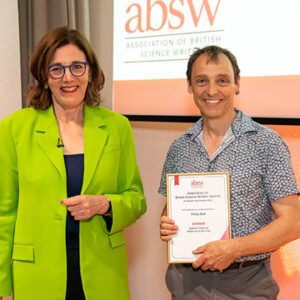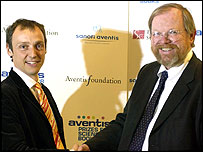Philip was awarded the Royal Society’s 2022 Wilkins-Bernal-Medawar Medal for excellence in a subject relating to the history of science, philosophy of science or the social function of science. The award citation mentions Philip’s “outstanding commitments to sharing the social, cultural, and historical context of science through prolific, and award-winning freelance science writing”.

Philip’s article “Should scientists run the country” won the 2022 award from the Association of British Science Writers for the best Opinion piece.
Institute of Physics Kelvin Award 2019. Philip was awarded the William Thomson, Lord Kelvin Medal and Prize 2019 by the Institute of Physics, for communication of physics. More information here.
Philip was awarded the Physics World Book of the Year 2018 for his book Beyond Weird.
Philip was Science Commentator of the Year 2017 in the Editorial Intelligence Comment Awards.
Philip was a judge of the Baillie Gifford Prize for Non-Fiction, 2016. Details here.
Philip was chosen as Science Commentator of the Year in the 2015 Comment Awards.
Philip was Science Commentator of the Year 2015 in the Editorial Intelligence Comment Awards.
Philip is a member of the core group of the Created Out of Mind residency project at the Wellcome Hub.
Serving the Reich was shortlisted for the Royal Society Winton Science Book Prize, 2014: see here.
Philip was shortlisted for the Comment Awards Science Commentator of the Year, 2014.
The Music Instinct was longlisted for the Samuel Johnson Prize (now The Baillie Gifford Prize) for nonfiction, 2010: see here.
The Music Instinct was shortlisted for the Royal Philharmonic awards, 2011.
Philip was made a Fellow of the Royal Society of Chemistry in 2011.
Philip was awarded an honorary degree (Doctor of Letters) from the University of Bristol in 2009.
The 2008 (inaugural) Lagrange Prize of the ISI and CRT Foundations (Italy) “for work aimed at dissemination and popularization of the concepts and notions of complexity science.”
Dingle Prize, 2007 (British Society for the History of Science) for “the best recent book that communicates the history of science, technology and or medicine to a wide audience of non-specialists”: awarded for Elegant Solutions: Ten Beautiful Experiments in Chemistry (RSC, 2006). See https://www.bshs.org.uk/
Critical Mass was awarded the Aventis Prize for Science Books, 2005

Click for more details from BBC.
Click to see the awards ceremony at the Royal Society
Click for more details from Nature
Click for more details from New Scientist
American Chemical Society James T. Grady-James H. Stack Award for Interpreting Chemistry for the Public, 2006
Philip was given the debatable honour of being designated ‘Guru of the Week’ by the Financial Times on 14 February 2004.
The Society for the History of Technology awarded Bright Earth the Sally Hacker Prize for best writing on the history of technology, 2003.
Philip was awarded an honorary Degree (Doctor of Science) from Union College, Schenectady, NY, awarded in February 2003.
Bright Earth was shortlisted for the US National Book Critics Circle award in the category ‘Criticism’, 2002.
Association of British Science Writers award 2001, for the best communication of science in a non-science context. Awarded for More Than Meets the Eye, booklet to accompany the exhibition of the same name at the V&A Museum, London, September-November 2001.
Premio Acqua Scrittura 2000: awarded in Salsomaggiore, Italy, for the best international writing on water. Awarded for H2O: A Biography of Water.
Association of American Publishers Award for the best new book in chemistry 1994, awarded for Designing the Molecular World.
Philip is on the editorial boards of Interdisciplinary Science Reviews and ComPlexUs. He is a member of the European Commision Expert Group on Synthetic Biology, the Advisory Council for the Institute of Advanced Study of Durham University, and the European editorial board of Princeton University Press.
